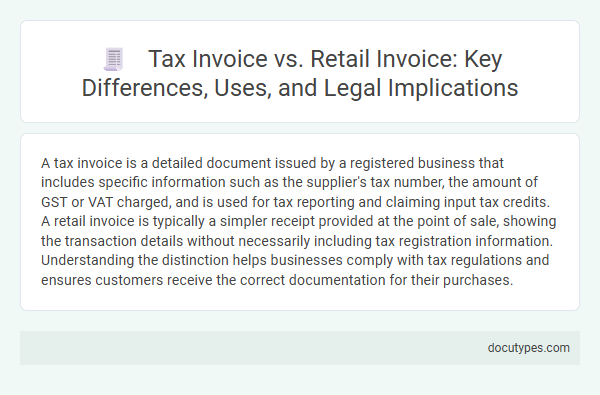A tax invoice is a detailed document issued by a registered business that includes specific information such as the supplier's tax number, the amount of GST or VAT charged, and is used for tax reporting and claiming input tax credits. A retail invoice is typically a simpler receipt provided at the point of sale, showing the transaction details without necessarily including tax registration information. Understanding the distinction helps businesses comply with tax regulations and ensures customers receive the correct documentation for their purchases.
Introduction to Tax Invoice vs. Retail Invoice
| Invoice Type | Description | Purpose | Key Features |
|---|---|---|---|
| Tax Invoice | Official document issued by a registered business detailing the sale of goods or services with applicable tax information. | Used for tax reporting, claiming input tax credits, and legal compliance with tax authorities. | Includes supplier's tax identification number, tax rate, tax amount, and total payable amount. |
| Retail Invoice | Simple sales receipt provided to customers at the point of sale for retail transactions. | Serves as proof of purchase for customers without detailed tax breakdowns. | Lists purchased items, prices, total amount, and payment method, often without tax specifics. |
| Understanding the distinction between a Tax Invoice and a Retail Invoice helps ensure your business meets both customer needs and regulatory requirements. | |||
Definition of Tax Invoice
A tax invoice is a specific type of document issued by a registered business to charge Goods and Services Tax (GST) or Value Added Tax (VAT). It serves as proof of the tax paid on a transaction.
- Tax Invoice Definition - A tax invoice details the taxable amount, tax rate, and total tax charged.
- Mandatory Information - It must include the seller's GST or VAT registration number and the buyer's identification if applicable.
- Legal Requirement - You must retain tax invoices for tax reporting and audit purposes.
The primary difference between a tax invoice and a retail invoice lies in the inclusion of detailed tax information required for tax compliance.
Definition of Retail Invoice
A retail invoice is a document issued by a seller to a buyer after the sale of goods or services, detailing the items purchased and the amount payable. It serves as proof of the transaction and includes information such as the date of sale, description of products, quantity, price, and total amount. Unlike a tax invoice, a retail invoice may not always contain tax-specific details like GST or VAT numbers, but it remains essential for record-keeping and warranty purposes.
Key Differences Between Tax Invoice and Retail Invoice
A tax invoice and a retail invoice serve different purposes in financial transactions. Understanding the key differences helps you manage documentation and compliance effectively.
- Purpose - A tax invoice is issued primarily for tax purposes to claim input tax credits, while a retail invoice is given as a sales receipt for consumer purchases.
- Content Requirements - A tax invoice must include the seller's GSTIN, tax rates, and tax amounts, whereas a retail invoice typically lists item prices and total amounts without detailed tax information.
- Legal Significance - Tax invoices are legally required for registered businesses to comply with tax regulations; retail invoices are generally for customer reference and record-keeping.
Legal Requirements for Tax Invoices
Tax invoices and retail invoices serve different purposes in business transactions. Understanding the legal requirements for tax invoices is crucial for compliance and accurate financial record-keeping.
- Tax invoices must include specific information - They require details such as the supplier's GST number, invoice date, and a clear description of goods or services.
- Retail invoices are simpler - These generally only need to show the sale amount, date, and seller's identity without stringent tax details.
- Compliance with tax laws is mandatory - Your business must issue tax invoices to claim input tax credits and adhere to government regulations.
Legal Requirements for Retail Invoices
A tax invoice is a document issued by a registered business showing detailed tax information, essential for claiming input tax credits. A retail invoice, however, is generally provided to end customers without detailed tax components.
Legal requirements for retail invoices vary by jurisdiction but often mandate including the seller's name, address, and a description of goods or services sold. Your retail invoice must typically show the total amount paid but might not require explicit tax details unless specified by law.
Common Uses of Tax Invoices
A tax invoice is a document issued by a registered business that details the amount of tax charged on goods or services sold. A retail invoice is generally provided to customers as a proof of purchase without detailed tax information. Tax invoices are commonly used for business-to-business transactions to claim input tax credits and comply with tax regulations.
Common Uses of Retail Invoices
A tax invoice is a document issued by a registered business detailing the sale of goods or services along with the applicable tax information, primarily used for tax reporting and input tax credit claims. A retail invoice, on the other hand, is a simplified receipt given to the end consumer, showing the purchase details without extensive tax breakdowns.
Retail invoices are commonly used in everyday transactions at stores, markets, and service outlets. They serve as proof of purchase for consumers and help in returns or exchanges. Retail invoices usually include item descriptions, quantities, prices, and the total amount paid, making them essential for customer records and warranty claims.
Legal Implications and Compliance Issues
What distinguishes a tax invoice from a retail invoice in terms of legal implications and compliance issues? A tax invoice is a legally required document for claiming input tax credits and must comply with strict regulations outlined by tax authorities. Retail invoices serve primarily as proof of purchase but lack the detailed tax information necessary for formal tax reporting and compliance.
What Is the Difference Between a Tax Invoice and a Retail Invoice? Infographic

